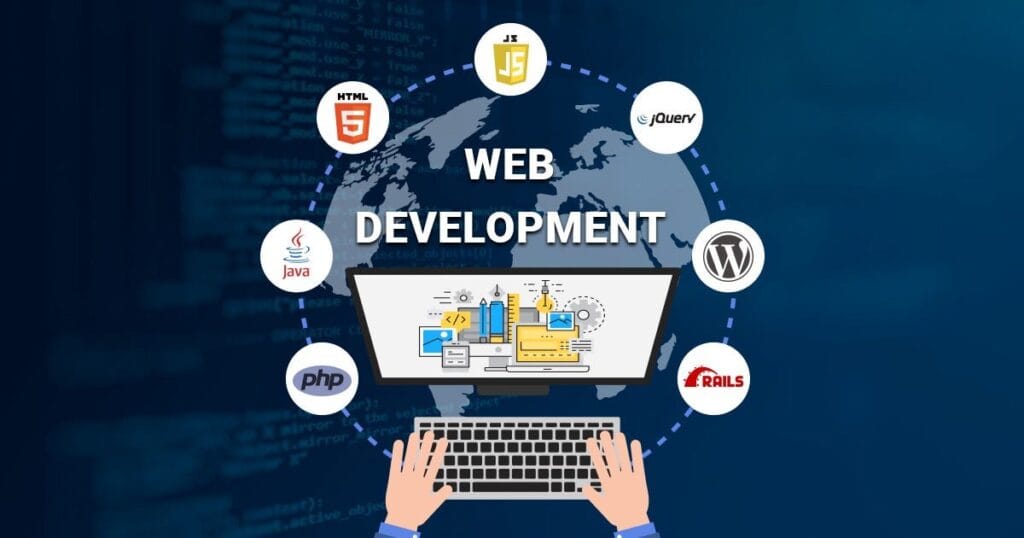WEBSITE DEVELOPER

In today’s world, almost every business, professional, or brand needs a website. A website is like a digital face of the company where people can learn, explore, and connect. But who createE Contacts these websites? That is where a website developer comes into the picture.
A website developer is a professional who designs, builds, and maintains websites. In simple words, they are the people who make sure your website looks good, works well, and is easy to use. Without website developers, the internet would not look the way we see it today.
This guide will take you through everything you need to know about website developers, including their role, types, skills, tools, benefits, challenges, and future trends.
What is a Website Developer?
A website developer is someone who uses coding languages, design tools, and problem-solving skills to create websites. Their job is not just about making a site attractive but also about ensuring it is functional, fast, and user-friendly.
Think of them as architects and builders of the internet. Just as an architect designs and builds a house, a website developer designs and builds a website.
A basic website might only need a few pages, while advanced websites like e-commerce stores, social networks, or online learning platforms need complex coding and strong functionality. That’s why website developers are in high demand.
Types of Website Developers
Not all website developers do the same work. There are mainly three categories:
1. Front-End Developer
Front-end developers take care of what users see and interact with on a website. They design the layout, buttons, forms, and graphics. Their focus is user experience (UX).
- They use languages like HTML, CSS, and JavaScript.
- Example: A front-end developer ensures that when you click a button on a shopping site, it responds instantly.
2. Back-End Developer
Back-end developers manage the server, database, and application logic of a website. This is the “behind the scenes” part that users do not see.
- They use languages like PHP, Python, Java, Ruby, or Node.js.
- Example: When you log into a website, a back-end developer makes sure your details are matched with the stored data.
3. Full-Stack Developer
A full-stack developer can do both front-end and back-end work. They have a broad skill set and can manage an entire project from start to finish.
Full-stack developers are highly valued because they understand both the visual side and the technical side of a website.
Key Skills of a Website Developer
To become a successful website developer, one needs both technical and soft skills. Some important ones are:
- Coding and Programming: Knowing multiple programming languages like HTML, CSS, JavaScript, PHP, Python, or Java.
- Problem-Solving: Every website comes with challenges, and developers must find smart solutions.
- Design Understanding: Even though designers often handle visuals, developers should know about layouts, colors, and user experience.
- Database Management: Websites need to store data, so developers must work with databases like MySQL or MongoDB.
- Communication Skills: Developers often work in teams or with clients, so explaining technical concepts in simple terms is key.
- Continuous Learning: Technology changes fast, so developers must keep updating their knowledge.
What Does a Website Developer Do?
The role of a website developer may vary based on projects, but their main tasks usually include:
- Creating Website Layouts: Deciding how the homepage, about page, and contact page will look.
- Writing Code: Using different languages to add functionality.
- Testing Performance: Checking how fast the website loads and fixing any issues.
- Maintaining Websites: Updating features and keeping the site secure.
- Working with Designers: Turning design mockups into real, working sites.
- Improving SEO: Making sure search engines can easily find and rank the website.
Tools Used by Website Developers
Just like builders use hammers and drills, website developers use special tools. Some popular ones include:
- Code Editors: VS Code, Sublime Text, Atom.
- Design Tools: Figma, Adobe XD, Sketch.
- Version Control: Git and GitHub for team collaboration.
- Frameworks: React, Angular, Vue.js for front-end; Django, Laravel, Node.js for back-end.
- Content Management Systems (CMS): WordPress, Drupal, Joomla for building sites quickly.
- Testing Tools: Selenium, Jasmine for checking bugs.
These tools make the development process faster, more efficient, and error-free.
Importance of Website Developers
Why are website developers so important in today’s world? Let’s break it down:
- Online Identity: A website is a company’s digital identity, and developers bring it to life.
- User Experience: Developers make sure visitors have a smooth and enjoyable experience.
- Credibility: Businesses with professional websites look more trustworthy.
- E-Commerce Growth: Online shopping depends heavily on strong and secure websites.
- Global Reach: Developers build websites that allow companies to reach customers worldwide.
- Adaptability: A skilled developer ensures the site works well on both desktop and mobile devices.
Freelance vs. In-House Website Developers
Many businesses face a choice: hire a freelance developer or keep a full-time developer in-house.
- Freelance Developers are independent workers who take on projects. They are great for small businesses or one-time tasks.
- In-House Developers are part of the company team. They work on continuous updates and long-term website needs.
Both have pros and cons, and the choice depends on budget, project size, and business goals.
Benefits of Having a Good Website Developer
- Customized Solutions: Every company has unique needs, and developers can build websites that fit perfectly.
- Better Security: Developers protect websites from hackers and cyberattacks.
- SEO Improvement: Skilled developers know how to optimize sites for higher search rankings.
- Time-Saving: A professional can build a site faster than someone without experience.
- Scalability: As the business grows, the developer ensures the website can handle more visitors and features.
Challenges Website Developers Face
Like any profession, website development also comes with challenges, such as:
- Keeping Up with Rapid Technology Changes: New frameworks and tools come up every year.
- Client Expectations: Sometimes clients want things that are complex or unclear.
- Cross-Browser Compatibility: A site must work well on Chrome, Firefox, Safari, etc.
- Mobile Responsiveness: With so many types of smartphones, developers must make sites adaptable.
- Cybersecurity: Protecting sites from attacks is a constant responsibility.
Future of Website Development
The future looks bright, as demand for online presence is growing daily. Some key trends include:
- Artificial Intelligence (AI): Smarter websites will use AI to personalize user experiences.
- Voice Interaction: With Alexa, Siri, and Google Assistant, developers now focus on voice search.
- Progressive Web Apps (PWAs): These are apps that work like both a website and a mobile app.
- Automation Tools: Advanced tools will make coding faster and more efficient.
- 3D and Interactive Design: Modern websites will include 3D elements for more engaging experiences.
As businesses continue to shift online, website developers will remain essential.
How to Become a Website Developer
For anyone interested in this career path, here are the steps:
- Learn the Basics: Start with HTML, CSS, and JavaScript.
- Build Projects: Create small websites to practice.
- Learn Back-End Skills: Understand databases and server-side coding.
- Use Frameworks: Explore React, Angular, or Django to speed up work.
- Create a Portfolio: Show your work to attract clients or employers.
- Stay Updated: Follow industry news, forums, and tutorials.
1. What does a website developer do?
A website developer designs, builds, and maintains websites. They write code to create visual layouts and make sure websites function well for users.
2. What skills should a good website developer have?
Key skills include knowledge of HTML, CSS, JavaScript, problem-solving ability, understanding of back-end languages like PHP or Python, and good communication skills.
3. What is the difference between front-end and back-end developers?
Front-end developers work on what users see and interact with on the website using HTML, CSS, and JavaScript. Back-end developers handle the server, databases, and application logic behind the scenes.
4. What programming languages do website developers use?
Common languages include HTML, CSS, and JavaScript for front-end, and PHP, Python, Ruby, or Node.js for back-end development.
5. How long does it take to develop a website?
The time depends on the site’s complexity. A simple website may take a few weeks, while large or e-commerce sites can take several months.
6. Can a website developer help improve my site’s SEO?
Yes. Developers optimize site structure, speed, and code, which can improve search engine rankings and user experience.
7. Should I hire a freelance developer or an agency?
Freelancers are good for small or quick projects, while agencies are better for larger, ongoing work because of their teams and resources.
8. What tools do website developers use?
Popular tools include code editors like VS Code, design tools like Figma, version control like Git, and frameworks such as React or Angular.
9. How can I become a website developer?
Start by learning basic coding languages (HTML, CSS, JavaScript), work on practice projects, then learn back-end skills and frameworks. Keep practicing and building a portfolio.
10. What challenges do website developers face?
They often deal with fast-changing technology, client expectations, ensuring compatibility across browsers/devices, and protecting websites from security threats
Conclusion
A website developer is much more than a coder. They are problem-solvers, designers, and creators who build the foundation of the digital world. From simple blogs to complex online stores, developers shape how we experience the internet every day.
Whether you are a business looking for a developer or someone considering it as a career, one thing is clear: website developers are in high demand and will continue to play a key role in the future of technology.
As the internet keeps evolving, so does the role of a developer. With the right skills, creativity, and passion, website developers can build not only websites but also opportunities that shape the digital future.
contact us
Facebook-facebook
Instagram- Exceptional Website Development Services Tricity | Taksh Sharma – Tricity Web Dev
website-role-of-seo-in-digital-marketing
external link –digitalnexamarketing.com

